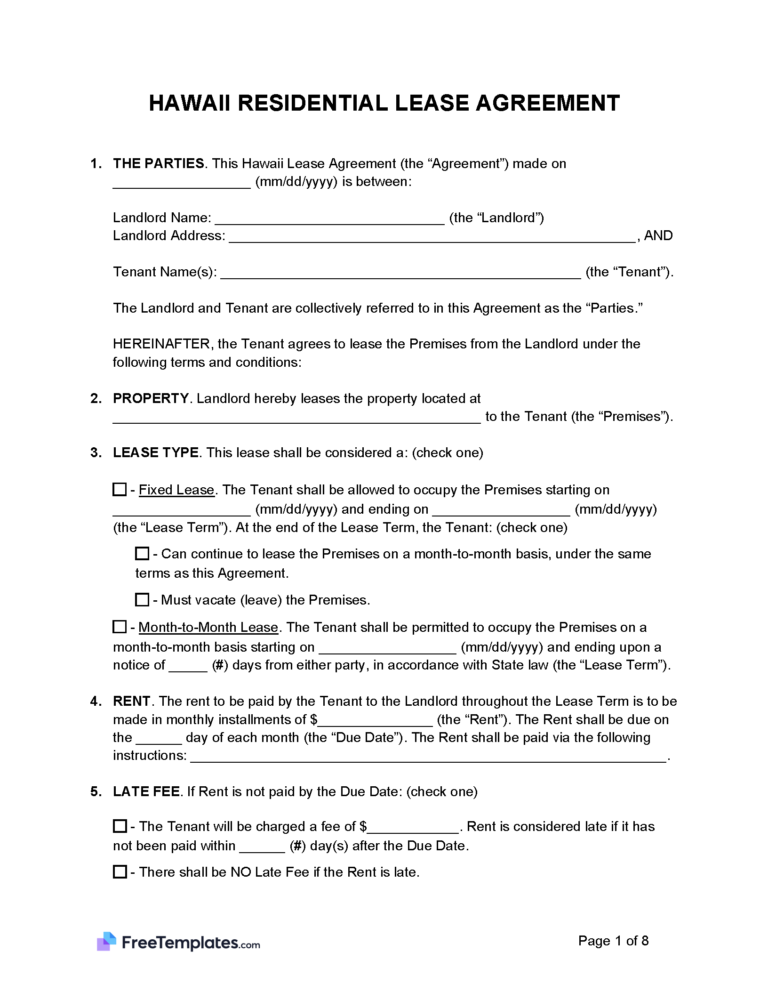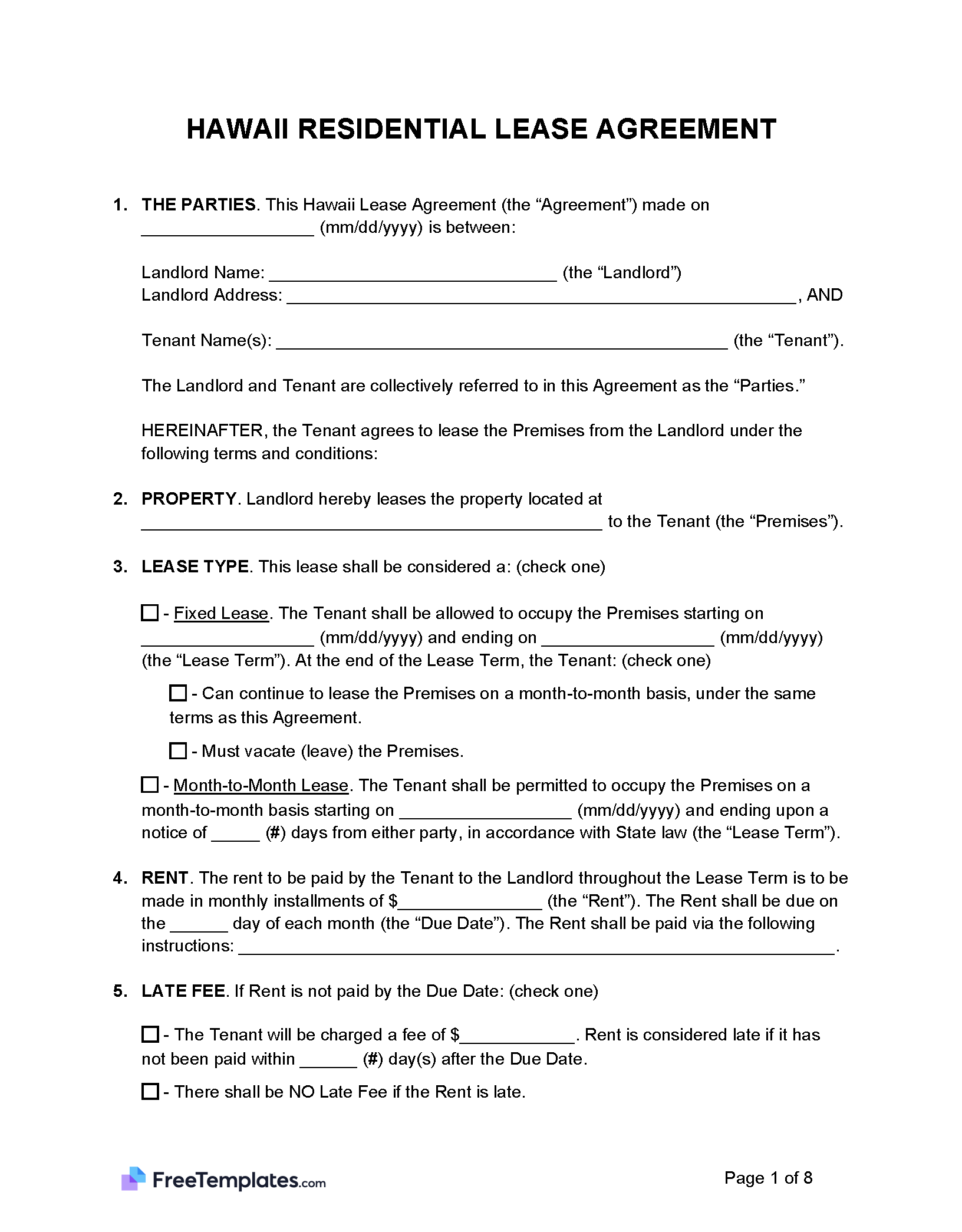By Type (6)
| Standard Lease Agreement – A legally binding arrangement outlining the terms and conditions of renting a residential property, agreed upon by the landlord and the tenant. |
| Commercial Lease Agreement – A contract between a landlord and a business tenant to rent commercial property. The document outlines the terms, such as rent, lease duration, and permitted use of the space, agreed upon by both parties. |
| Month-to-Month Lease Agreement – A rental arrangement between a landlord and a tenant for a monthly period of time. This allows the tenant to have a short-term obligation, providing flexibility. In Hawaii, rent may be increased with 45 days’ notice. |
| Rent-to-Own Agreement – A contract where the tenant agrees to rent a property with the option to purchase the rental later, typically at a predetermined price. |
| Roommate Agreement – A legal accord agreed upon by individuals sharing a property. It can outline rent division, shared expenses and utilities, and household responsibilities. This ensures clear expectations and reduces potential conflicts. However, it does not replace the contract with your landlord. |
| Sublease Agreement – A contract in which the original tenant leases all or part of the rental unit to a new tenant for a disclosed amount of time. During this period, the original tenant remains responsible to the landlord for terms and conditions disclosed in their lease agreement., such as paying rent. |
Disclosures (3)
Landlord’s Contact Details – Before the tenant moves in, the owner or landlord must provide the tenant with information about each person authorized to manage the property in writing, as well as who is responsible for rent, notices, and demands. This information must be kept up to date. (HRS § 521-43(A)) Should the owner or landlord live outside the state or on a different island from where the rental unit is located, they must identify an agent residing on the same island to act on their behalf. If the rental agreement is oral, the owner or landlord must provide this information in writing to the tenant upon request. (HRS § 521-43(F))
Lead-Based Paint Disclosure – In properties built before 1978, landlords must inform tenants of the dangers of lead-based paint and disclose whether any lead-based paint is in the rental properties.
Mold Disclosure – Landlords must inform tenants about the presence of mold in any residential, commercial, or industrial rental properties. (HRS § 508D-11(3a))
Security Deposit
Maximum Amount – In Hawaii, the landlord can charge no more than one month’s rent plus an additional Pet fee that would cover any damages caused by an animal allowed to reside in the rental unit, as disclosed in the rental agreement. However, the landlord cannot charge a Pet fee for assistance animals or tenants with disabilities. (HRS §521-44(2))
Returning to Tenant – Within 14 days of the termination of the lease agreement, landlords must notify the tenant in writing if any of the security deposit will be withheld or the deposit in full. Any disputes regarding the security deposit can be handled in the small claims division of the district court. (HRS §521-44(c))
Itemized List Required? If keeping any of the deposit due to damages or unpaid rent, the landlord must list the reasons and written evidence of the costs incurred to repair, including estimates, invoices, or receipts with any remaining portion. Should the landlord fail to provide this notice to the tenant, the landlord forfeits their right to withhold the deposit. (HRS §521-44(c))
Landlord Access
General Access – Landlords must give the tenant 2 days’ notice before entering the rental unit, preferably in writing. This is so that landlords can inspect the properties and make any repairs, decorations, alterations, or improvements. It also ensures that landlords or their agents can show prospective tenants or buyers the premises. If the tenant withholds the landlord’s consent to enter, the landlord can hold the tenant liable for any resulting damages. (Landlord Tenant Information)
Emergency Access – The landlord can only enter the rental property without notice during an emergency or if the tenant appears to have abandoned the dwelling unit. (Landlord Tenant Information)
Unreasonable Entry – If the landlord repeatedly demands entry for arbitrary reasons, the tenant may terminate the rental agreement, file suit, and ask for a fine of up to $100.00. (Landlord Tenant Information)
Paying Rent
Receipts – The landlord must provide the tenant with a written receipt for rent payments when they are made. (HRS § 521-43(E))
Grace Period – There is no mandatory grace period in Hawaii.
Maximum Late Fee – Landlords can charge up to 8% of the amount due if the tenant delays paying rent. (HRS §521-21(f))
Returned Checks (NSF) – If the tenant’s check bounces, the landlord can charge a fee of up to $30.00. (HRS §490:3-506.5)
Reasons for Eviction (3)
Non-Payment of Rent – Failure to pay rent is cause for eviction. In this case, the landlord serves the tenant with a five-day pay or quit notice. (HRS § 521-68)
Non-Compliance – In Hawaii, a lease violation, such as failure to maintain the property or unlawful use of the property, is cause for eviction. The landlord must serve a notice outlining the breach and give the tenant 10 days to restore the violation or vacation the property. (HRS § 521-51)
Unconditional Notice to Quit – in the event that the tenant causes or threatens to cause irreparable damage to any person or property on the leased property, the landlord can give immediate notice to vacation. This does not allow the tenant to remedy the conditions. (HRS § 521-69)

